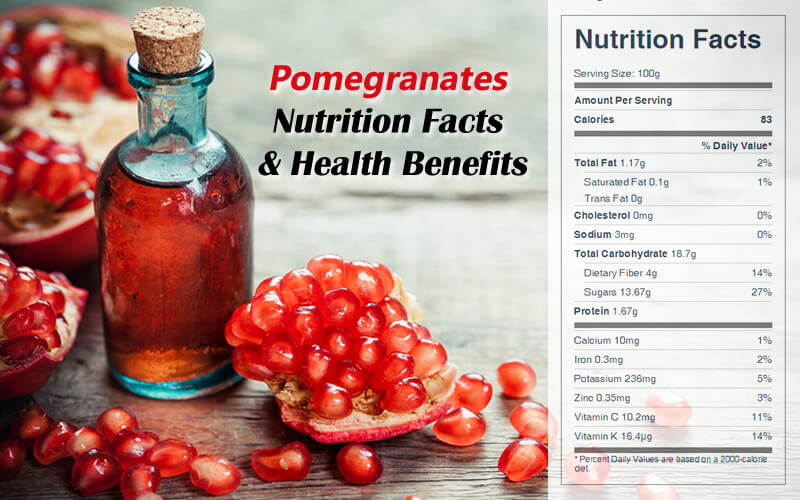Pomegranates Nutrition Facts & Health Benefits
The pomegranate is a fruit-bearing deciduous shrub and is an extraordinarily powerful and natural antioxidant. Pomegranates are low in calories, fat, and sodium. They taste great when freshly juiced. Here are nutrition facts & health benefits of pomegranates.
The edible portion of raw pomegranate is 78% water, 19% carbohydrates, 2% protein, and 1% fat. Pomegranate seeds are a rich source of dietary fiber which is entirely contained in the edible seeds. Pomegranate seed oil contains punicic acid (65%), palmitic acid (5%), stearic acid (2%), oleic acid (6%), and linoleic acid (7%).

Pomegranate juice is high in potassium and a good source of vitamin C, vitamin B5 (pantothenic acid), and many polyphenols and antioxidants, some of them unique to this fruit. The concentration of protective bioflavonoids in the fruit is even greater than that found in grapes or green tea.
Raw Pomegranates Nutrition Facts Label
Health Benefits of Pomegranates
Pomegranates are a true superfood. All the evidence shows that pomegranates are protective against heart disease, circulatory disorders, degenerative and inflammatory conditions, and even some types of cancer.
Anthocyanins are what give pomegranates that rich red color, and they contribute to their antioxidant, antiinflammatory, and antiproliferative properties.
Pomegranates are an extraordinarily powerful and natural antioxidant. One small glass of pomegranate juice provides three times the ORAC of the same quantity of red wine. It has demonstrated potential in the laboratory, including in preliminary human trials, for reducing several risks related to oxidation and atherosclerosis that are involved in heart disease.
Therapeutic benefits seen in pomegranates come from ellagic acid and ellagitannins. These compounds are also what give green tea its therapeutic benefits. Studies have found that pomegranate juice has two to three times the antioxidant capacity of green tea or red wine due to its ellagic acid content, and half of pomegranate juice’s antioxidant effect is attributed to its ellagitannin content.
Ellagitannins are broken down to form ellagic acid in the gut and then metabolized in the colon to form urolithin A and B. These compounds are prebiotics, and they play an important role in promoting gut health. Studies have found these enhanced the growth of our immune system supporting bacteria Bifidobacterium and lactobacillus.
Health Tips
Pomegranates keep amazingly well for a fruit—two to three weeks at room temperature and two to three months in the refrigerator.
Choose a pomegranate that feels heavy in the hand and has a skin free of cracks and brown spots.
To make your own pomegranate juice from a fresh fruit, roll the pomegranate back and forth on a table with your palm, pressing gently. Then cut the pomegranate in half and squeeze out the juice.
When purchasing pomegranate juice, choose a juice that is 100 percent pomegranate juice and not from concentrate. It’s delicious mixed with sparkling water and ice for a refreshing, and lighter, drink.